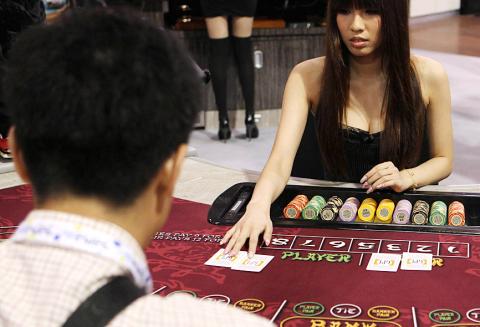As billions of dollars pour into Asia’s gleaming casinos, they are becoming the front line of a sometimes hugely lucrative battle between cheats and the house, experts say.
Both sides look to employ the latest, most advanced technology, but security consultant Sal Piacente says a scam in the Philippines last year took the gaming security world by surprise.
An Asian syndicate used an improvised camera hidden up a member’s sleeve to film the sequence of cards in a deck as it was cut on a baccarat table in Paranaque City in May last year.

Photo: AFP
The order of the cards was relayed digitally to another gang member who, after analyzing the footage in slow-motion, returned to the table as the deck finally came into play hours later.
Piacente, a 47-year-old from Brooklyn, said the multimillion-dollar “cutter scam” showed that as long as Asian casinos were the most lucrative in the world, they would attract the most skillful cheats.
“The scams that happen here [in Asia] are a lot more sophisticated than in the States,” he said at the Global Gaming Expo Asia in Macau, which generates five times the annual gambling revenue of Las Vegas.
“What was happening here in Macau five years ago, is happening in the States now,” he said.
Asia is in the midst of a casino building boom, fueled by wealthy VIP gamblers from China, with billions of dollars being invested in huge integrated casino resorts from Macau to Manila Bay and Singapore.
The new properties bristle with cutting-edge surveillance technology, but the cheats are coming up with their own high-tech innovations, such as the sleeve-camera used in the Philippines.
“If you go to a place like this in Macau, where the surveillance is a lot better trained, then the cheats have to be more sophisticated,” Piacente said on the expo floor at the glittering Venetian Macau resort.
Most of the exhibitors at Asia’s largest casino expo, which ended on Thursday, showed off the latest slot machines or video gambling innovations, but Piacente’s booth consisted of himself, a baccarat table and a bag of tricks.
Loaded dice, split chips and reflective gold rings are some of the more traditional tools of the cheater’s trade, which Piacente, president of UniverSal Game Protection, demonstrates with a magician’s flare.
He is also a master of sleight of hand — false shuffles, second deals, card palming — and can memorize a deck of cards instantly from sight.
He has worked a lifetime to perfect his skills, but tells his clients in the gaming world that the real cheats will be smarter, faster and better — especially in Asia where so much more money is at stake.
“I sit at home and practice thousands of moves for hundreds of hours. They’re at home practicing one move for thousands of hours. They do that one move better than I could possibly imagine,” he said.
“An amateur practices until he gets it right; a professional practices until he can’t get it wrong,” he said.
It is a constant battle.
Hoffman Ma, deputy chairman of Success Universe Group, which owns the Ponte 16 casino in Macau, said US anti-fraud system manufacturers were tailoring their latest products for Asian casinos.
“We do probably have one of the most advanced systems,” he said. “Technology helps you to be more efficient ... and with the huge traffic [of casino gamblers in Macau] you really need that assistance,” he said.
Nevada casinos, in contrast, were hit hard by the 2008 financial crisis and are struggling to keep up with surveillance technology, experts said.
“I hate to say it’s archaic,” said Douglas Florence, business development director at Canadian security camera company Avigilon, adding that many Las Vegas casinos still relied on grainy video stored on VHS tapes.
“Asia has been digital almost since day one because everything is new,” he said.
Avigilon has partnered with South African company Cheeteye, which offers casinos software that scours data from multiple sources to identify suspicious behavior patterns, such as increases in a certain player’s average wager.
Cheeteye representative Graeme Powell said the company’s revenues had doubled in the past two years as casino managers, particularly “young, tech-savvy” ones, adopted the system.
As for the Paranaque City cutter scam, several suspects have been arrested, while the alleged ringleader, Singaporean lawyer Loo Choon Beng, was reportedly found dead in a Chinese hotel room in August last year.

LANDMARK CASE: ‘Every night we were dragged to US soldiers and sexually abused. Every week we were forced to undergo venereal disease tests,’ a victim said More than 100 South Korean women who were forced to work as prostitutes for US soldiers stationed in the country have filed a landmark lawsuit accusing Washington of abuse, their lawyers said yesterday. Historians and activists say tens of thousands of South Korean women worked for state-sanctioned brothels from the 1950s to 1980s, serving US troops stationed in country to protect the South from North Korea. In 2022, South Korea’s top court ruled that the government had illegally “established, managed and operated” such brothels for the US military, ordering it to pay about 120 plaintiffs compensation. Last week, 117 victims

‘HYANGDO’: A South Korean lawmaker said there was no credible evidence to support rumors that Kim Jong-un has a son with a disability or who is studying abroad South Korea’s spy agency yesterday said that North Korean leader Kim Jong-un’s daughter, Kim Ju-ae, who last week accompanied him on a high-profile visit to Beijing, is understood to be his recognized successor. The teenager drew global attention when she made her first official overseas trip with her father, as he met with Chinese President Xi Jinping (習近平) and Russian President Vladimir Putin. Analysts have long seen her as Kim’s likely successor, although some have suggested she has an older brother who is being secretly groomed as the next leader. The South Korean National Intelligence Service (NIS) “assesses that she [Kim Ju-ae]

In the week before his fatal shooting, right-wing US political activist Charlie Kirk cheered the boom of conservative young men in South Korea and warned about a “globalist menace” in Tokyo on his first speaking tour of Asia. Kirk, 31, who helped amplify US President Donald Trump’s agenda to young voters with often inflammatory rhetoric focused on issues such as gender and immigration, was shot in the neck on Wednesday at a speaking event at a Utah university. In Seoul on Friday last week, he spoke about how he “brought Trump to victory,” while addressing Build Up Korea 2025, a conservative conference

China has approved the creation of a national nature reserve at the disputed Scarborough Shoal (Huangyan Island, 黃岩島), claimed by Taiwan and the Philippines, the government said yesterday, as Beijing moves to reinforce its territorial claims in the contested region. A notice posted online by the Chinese State Council said that details about the area and size of the project would be released separately by the Chinese National Forestry and Grassland Administration. “The building of the Huangyan Island National Nature Reserve is an important guarantee for maintaining the diversity, stability and sustainability of the natural ecosystem of Huangyan Island,” the notice said. Scarborough